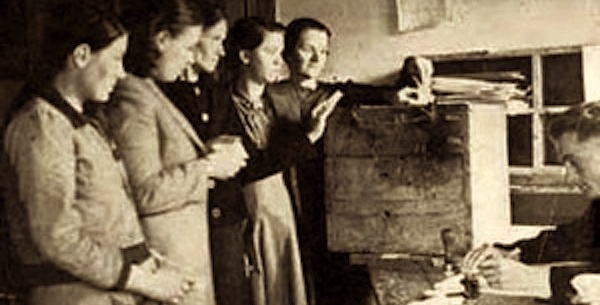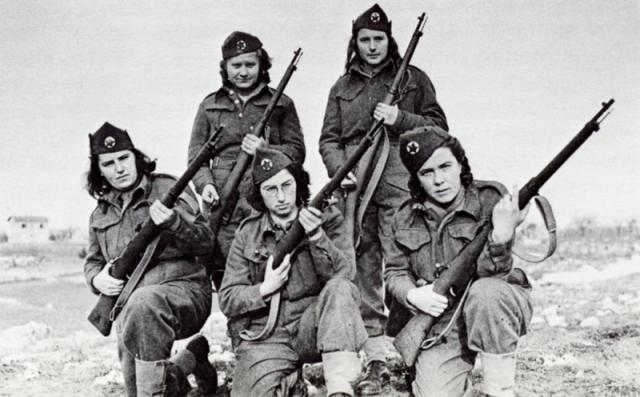Polina Spartyanova
When people cross the threshold of the polling stations and exercise their right to vote, they do not think about the obstacles that society went through to gain this freedom of choice. However, if you go back in history it becomes clear that the female gender actually fought the most difficult battle to gain suffrage. The women in the Balkan Peninsula began their struggle for voting rights in the early 20th century along with their followers from the rest of the continent, the last winning battle in the region being in favour of Greek women.
Albanian women were the first to gain voting rights in the Balkans in 1920, thanks to the fact that the first steps towards the European enlightenment of women there were made back in 1891, when the first school for girls was opened in the country. The first missionary school was sponsored by the USA and it was precisely it that offered women a chance to separate from their families without losing their identity. Twenty years later, Albanian women for the first time organized a movement aimed to exert pressure on the government and to help towards educating Albanian women in general, and it developed into a struggle for voting rights.

The wave of emancipation of the female population gradually overwhelmed the rest of the Balkan Peninsula, due to the surrender of the Ottoman Empire from these territories at the beginning of the 20th century and the political turmoil that occurred after each war in the region. When Mustafa Kemal came to power in Turkey in 1923 and undertook the difficult task to align the country with modern Europe, he said at one of the meetings with his associates, "We must become civilized. Our thoughts, our attitudes must change from head to toe ... we can no longer wait. Civilization is such a hot fire that it burns and destroys everything that remains out of it..."
Thus he laid the path for just the beginning of the Kemalist Revolution, which initiated a series of changes in Turkish society so as to break with its roots in the Ottoman Empire. This led to 4 October 1926 when a new Civil Code was approved, which entitled men and women to equal rights and, only a few years later, the status of Turkish women improved even more. After 3 April 1930, the gentle sex was entitled to participate in municipal elections and every woman could elect and be elected at the local, and, after 1935, at the national level.
Shortly afterwards Bulgarian women gained voting rights in their country, even if only on paper. Bulgarian feminists, excited about the achievements of women's movements in neighbouring countries after World War I, resumed their campaigns to the government and political parties, insisting on women gaining political and civil rights, equal to those of men, but their requests were rejected by the government. It was not until 1937 that Bulgarian women gained partial political rights with the law on local elections that entitled only mothers of legal marriage to vote but deprived them of the passive voting right and the ability of being elected deputies.
Ten years later, when the Fatherland Front was in power, a new Constitution known as "Dimitrov’s Constitution" was adopted under which "all citizens of the People's Republic of Bulgaria aged over 18 years have the right to elect and be elected, regardless of gender, nationality, race, religion..." and thus women and men in Bulgaria became equal. The idea of the Communist Party at that time was to create a collective image in society and equally involve men and women in the field of labour. Actually, the government did not eliminate sexism but limited it and gender equality propagated by it did not occur during the totalitarian regime in Bulgaria.

In the neighbouring Socialist Federal Republic of Yugoslavia, which also established an authoritarian regime, there were no particular results in achieving gender equality beyond the legal norms either. During World War II, the Yugoslav People's Liberation Army led by Josip Broz Tito organized a women's anti-fascist front in occupied Yugoslavia and recruited women for its armed partisan movement. The army allowed the participation of women in the Communist Party and entitled them to elect and be elected to undertake administrative tasks and functions. As a result of the involvement of women in the anti-fascist resistance during World War II, the new Constitution of the Socialist Federal Republic of Yugoslavia for the first time in 1946 contained their political, social and economic rights that reflected the radical and revolutionary view of the Yugoslav Communist Party regarding the previous national and class differences.
Unlike the other Balkan countries, the new legislation in Yugoslavia aimed to overcome the discriminatory treatment of women in terms of their economic and inheritance rights, custody of children in the case of divorce and the birth of illegitimate children.
Home of democracy, Greece, was the last that granted suffrage to women in the country because of the large number of wars and the subsequent political instability. Due to the opposing political forces after the end of the Civil War in Greece, its governments did not remain in power for long, and a total of 17 different governments ruled Greece in the period from 1945 to 1952. In 1952, when the government of Dimitrios Kiosopoulos was in power, it adopted a new constitution that made voting in Greece compulsory and the elections were held under the new electoral law that introduced the majoritarian voting system.
It laid the beginning of the new order in society and on 28 May 1952, Greek women were granted suffrage. Under the new law, they had the right to elect and be elected in local and parliamentary elections. However, they failed to participate in the elections for a new government the same November as their registration on the electoral roll was delayed. The Third Hellenic Republic in 1974 put an end to the discrimination against women in education and various professional fields only after 1975, when it introduced the constitutional equality of women and men in Greece.
Today, 39 years later, democracy in Greece has come to such a development that it makes it possible even for a foreigner, Bulgarian Kostadinka Kuneva, to be elected a Member of the European Parliament on the ticket of the Greek SYRIZA party.